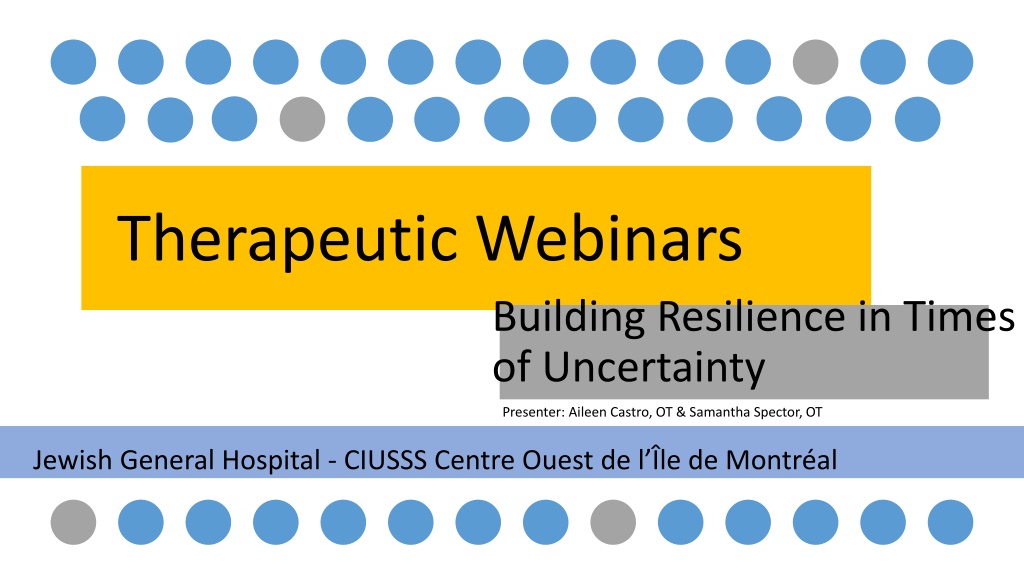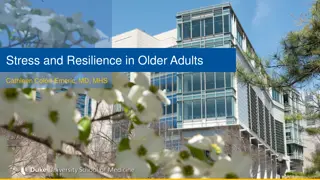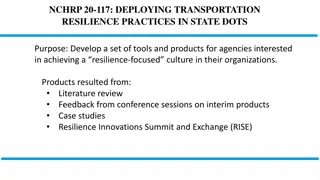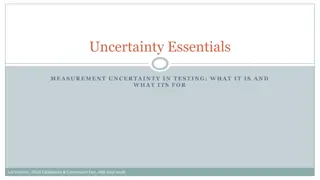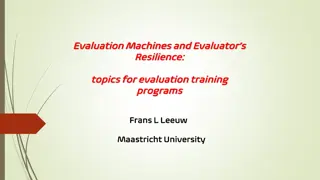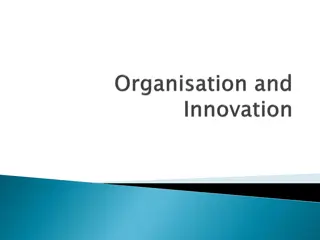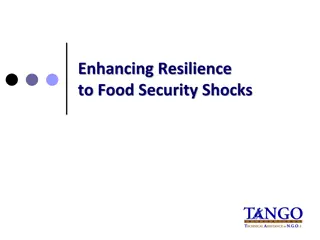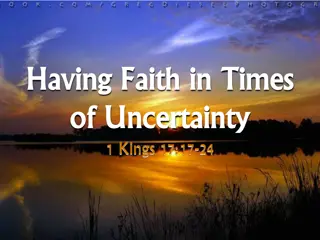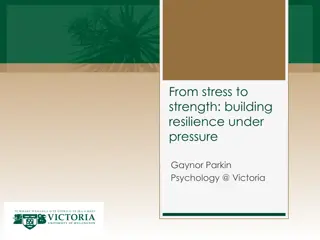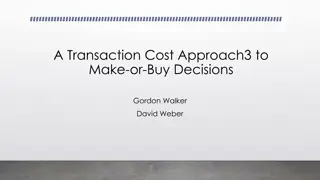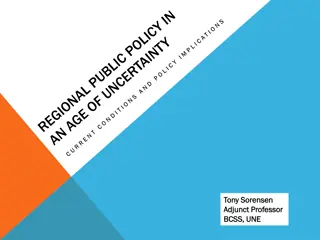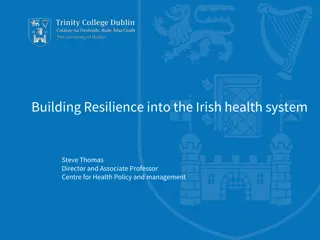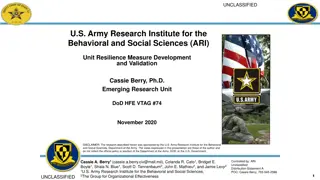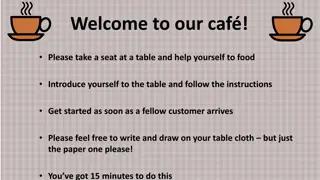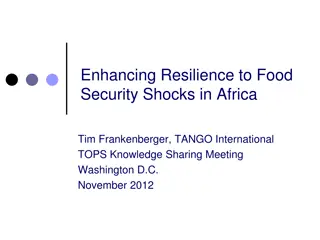Building Resilience in Times of Uncertainty
Amid the challenges brought by COVID-19, individuals are facing instability and stress due to social and physical distancing measures. This webinar by Aileen Castro and Samantha Spector explores strategies to enhance resilience in the face of uncertainty and change, emphasizing the importance of adaptability and recovery from difficult situations. The presenters aim to empower participants in developing resilience skills to navigate daily activities effectively.
Uploaded on Sep 07, 2024 | 0 Views
Download Presentation

Please find below an Image/Link to download the presentation.
The content on the website is provided AS IS for your information and personal use only. It may not be sold, licensed, or shared on other websites without obtaining consent from the author.If you encounter any issues during the download, it is possible that the publisher has removed the file from their server.
You are allowed to download the files provided on this website for personal or commercial use, subject to the condition that they are used lawfully. All files are the property of their respective owners.
The content on the website is provided AS IS for your information and personal use only. It may not be sold, licensed, or shared on other websites without obtaining consent from the author.
E N D
Presentation Transcript
Therapeutic Webinars Building Resilience in Times of Uncertainty Presenter: Aileen Castro, OT & Samantha Spector, OT Jewish General Hospital - CIUSSS Centre Ouest de l le de Montr al
Disclaimer These webinars are not therapeutic or clinical encounters. They are informational sessions. Presenters cannot provide individualized input to participants. Please respect privacy and confidentiality of other participants. We do not tolerate any violence or discrimination. If the presenters deem anyone's participation to be inappropriate, they may remove participants from the webinar, at their discretion. We cannot address acute safety concerns within the context of these webinars. If you are feeling unsafe with yourself, please leave the webinar and contact crisis services, such as Tracom 514 483 3033 or ultimately 911.
Introductions Welcome to our first Life Skills Webinar about Resilience Aileen Castro, occupational therapist working at the Jewish General Hospital /Mental Health Samantha Spector, occupational therapist and co-presenter also working at the JGH in Mental Health Format: Up to 30min, which includes a 10. min question period at the end Questions: Write them in Q & A section Polls
Building Resilience in Times of Uncertainty Poll Question: Have you ever heard the term Resilience? Yes or No What is the definition? How would you define it in your own words? What does it mean to be resilient? What does it look like? Feel like? Sound like? On a piece of paper, write down, or simply think about a situation in the past when you have shown resilience during a difficult situation, or when faced with a big challenge in your life. Think about how you got through it.
Building Resilience in Times of Uncertainty Challenges associated with COVID-19, causing instability, stress Social and physical distancing for example has forced us to do things in a very different way A lot of people have been feeling the effects of these sudden changes Everyone reacts or is affected by this change differently. We are all faced with the uncertainty of this pandemic Now more than ever is a good time to look at strategies that could help build our resilience as we all try to manage in our day to day activities
Defining Resilience Basic definition: Commonly known as the ability to bounce back from a difficult/challenging situation, a trauma Broader definition has emerged: Capacity to prepare for, recover from, and adapt in the face of stress, adversity or challenge Good resilience = ability to bounce back faster + with less stress (take things in stride, roll with punches, feel in control) Helps us learn and grow from adversity An ongoing process (similar to Recovery) Like building a muscle, building resilience takes time and effort, but it is possible to increase your resilience!
Resilience Adversity/challenge/trauma Growth Psychological well-being Bouncing back Inadequate resolution Anxiety, depression
What resilience isnt? Doesn t mean that a person won t experience difficulty when faced with a challenge It s normal to feel stressed/anxious, sad, angry, etc It s normal to feel destabilized
Building Resilience A Few Strategies Sleep Physical Health/exercise Having a positive outlook on life (Optimism) Gratitude, appreciation, silver lining Looking at personal strengths/qualities/accomplishments Looking at unhelpful thinking patterns, CBT strategies Emotional Management Increased awareness Identifying stressors, implementing healthy coping strategies Relaxation, grounding, mindfulness, self-compassion Engaging in activities or occupations that are meaningful, that provide psychological well-being The 5 C s
Consider these 5 types of activities that could help build resilience when facing difficult times/challenges. The 5 C s Examples of Activities Stretching, yoga/taichi, cleaning, organizing, doing the dishes, coloring a mandala, knitting, walk around the neighborhood/in nature Centering Activities that create order and/or movement, often repetitive, to decrease anxiety and restlessness Meditation, mindfulness, breathing exercises, journaling Contemplation Activities that make us aware and more mindful of the present moment Creation Activities that fulfill our need for beauty, by creating it, but also by appreciating it. Art, music, writing, building, drawing a mandala, cooking/baking Volunteering, offering random acts of kindness, helping others Contribution Activities that allow us to give back, to be productive and be valued citizens. Sharing a virtual meal with friends/family, smile to others/or greet others you see, share a joke/funny story, call/chat/text/email someone, care for a plant/pet, virtual board game Connection Activities that reinforce our sense of community
The 5 Cs What is one C that you are good at, or that you already do? What is one C that you could work on?
Avoiding junk activities Like junk food is bad for our health, there are also junk activities . We all have a certain amount of these activities the trick is to have a balance! Let s name a few:
Take Home Message It s normal to experience difficulty during these uncertain times. Everyone reacts differently and have different levels of Resilience. Although some things are out of our control. We can still build our Resilience. We are all together in this, and stand together is this difficult time. We can empower ourselves to face challenges, we can learn to adapt, recover, and grow from adversity. Do not put pressure on yourself. There is not one right balance to achieve. So remain indulgent with yourself, it s not a failure if it didn t work. It s an opportunity for learning.
Remember the 5 C`s: activities that are meaningful Contemplation (meditation, mindfulness) Centering (walking, cleaning/organizing, coloring a mandala, knitting) Creation (art, music, cooking, writing) The 5 C s Connection (friends, family, caring for your pet/plant) Contribution (volunteering, random acts of kindness, helping others) Junk activities
Take Home Message Other Strategies Emotional Management (id. Stressors/triggers, relaxation, building awareness, mindfulness, etc.) Sleep (7-9 hrs) Physical Exercise (walking, stretching, yoga, Taichi, etc.) Positive Outlook (gratitude, unhelpful thinking patterns, looking at personal strengths, etc.)
"Physical or emotional discomfort is a positive signal that change is needed to grow, that higher adaptation is possible - humans have the capacity to bounce back" (Bussolari and Goodell, 2009).
Hope to see you next week for our Webinar on Self- care Thank you for joining! Additional resources can be found on our website: www.jgh.ca/icfp
